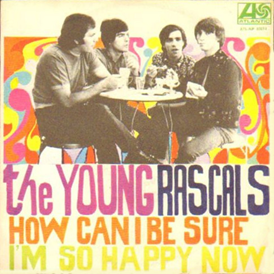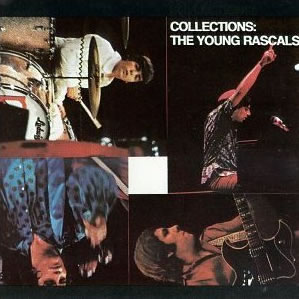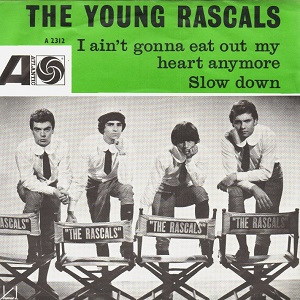
The Rascals are an American rock band, formed in Garfield, New Jersey east of Paterson in 1965.

Edward Brigati Jr. is an American singer-songwriter. He was the co-lead vocalist, along with Felix Cavaliere, and percussionist in the rock group The Young Rascals from 1964 to 1970.

Felix Cavaliere is an American musician. He is best known for being the co-lead vocalist and keyboard player for The Young Rascals.

Freedom Suite is the fifth studio album by rock band The Rascals, released on March 17, 1969. It peaked at number 17 on the Billboard Top LPs chart and also reached number 40 on the Billboard Black Albums chart, the last Rascals album to appear there.

Peaceful World is the eighth studio album by the American rock band The Rascals, released on May 5, 1971. It peaked at number 122 on the Billboard 200 chart. In Canada, the album reached number 50. The single "Love Me" reached number 95 on the Billboard Hot 100.

"How Can I Be Sure" is a popular song written by Felix Cavaliere and Eddie Brigati, and originally recorded by the Young Rascals for their 1967 album Groovin' with a single release in August 1967 affording the group their fourth Top 10 hit.

Tonin' is the sixteenth studio album by The Manhattan Transfer. It was released in 1995 on Atlantic Records. The expression "tonin'" is associated with the vocal groups of the 1950s and 1960s. The songs on this album are favorites of the band's from that era. Singer-songwriter Laura Nyro makes one of her last performances on this recording.

"Groovin'" is a song written by the American singer songwriters Felix Cavaliere and Eddie Brigati, initially recorded by their group the Young Rascals in 1967. Cavaliere was inspired to compose the song by his girlfriend Adrienne Buccheri, whom he only got to meet on Sundays amidst heavy touring and recording. Musically, the song differs from most of band's previous output, leaving the garage rock genre for Latin American influences, such as baião. Lyrically, "Groovin'" tells the tale of a narrator spending time with his partner on a Sunday afternoon. The song was arranged and recorded at the Talentmasters Studios, New York City in March of 1967.

Time Peace: The Rascals' Greatest Hits is a greatest hits album from the Rascals, released on June 24, 1968. It reached number one on the Billboard Pop Albums chart by September 1968. It also topped the Cash Box albums chart with a run in the Top 10 for 20 consecutive weeks

Once Upon a Dream is the fourth studio album by the rock band the Rascals, released February 19, 1968. The album rose to number 9 on the Billboard Top LPs chart and number 7 on the R&B chart.
David Brigati is an American singer. He is sometimes known as "the fifth Rascal".

The Young Rascals is the debut album by the American rock band the Young Rascals. The album was released on March 28, 1966, and rose to No. 15 on the Billboard Top LPs chart and No. 10 in Cashbox.

Collections is the second album by the rock band the Young Rascals. The album was released on January 9, 1967 and rose to #15 on the Billboard Top LPs chart, and to #8 in Canada.

Groovin' is the third album by the rock band the Young Rascals. The album was released on July 31, 1967 and rose to #5 on the Billboard Top LPs chart, number 7 on the R&B chart, and number 2 in Canada. Eight of the songs were released on singles with the title track reaching number 1 on the Pop chart in the U.S.

Search and Nearness is the seventh studio album by rock band the Rascals, released on March 1, 1971. It was the last album featuring Eddie Brigati and Gene Cornish as well as the group's last album released on Atlantic Records.

O'Keefe is an album by singer-songwriter Danny O'Keefe, released in 1972. It peaked at #87 on the Billboard Top LPs chart. The lead-off single was "Good Time Charlie's Got the Blues", which reached #9 on the Billboard Hot 100 chart and was covered by numerous artists. "The Road" was covered by Jackson Browne on his album Running on Empty. O'Keefe was reissued in 2006 on the Wounded Bird label.

Gene Cornish is a Canadian-American musician. He is an original member of the popular 1960s blue-eyed soul band The Young Rascals. From 1965 to 1970, the band recorded eight albums and had thirteen singles that reached Billboard's Top 40 chart. In 1997, as a founding member of The Rascals, Cornish was inducted into the Rock & Roll Hall of Fame.

"I Ain't Gonna Eat Out My Heart Anymore" is a song written by Pam Sawyer and Laurie Burton in 1965. Originally envisioned to be recorded by a British Invasion artist, the song was extremely well liked by the American rock group the Young Rascals, and they subsequently recorded the song and released it as their debut single in November 1965 through Atlantic Records. Though only a marginal hit, reaching number 52 on the Billboard Hot 100, it largely established the band on the American music scene. It has since been included on several albums by the band, including their eponymous debut album, and several compilation albums, including Time Peace: The Rascals' Greatest Hits, on which it was the opening track.

The Very Best of The Rascals is a compilation album from the Rascals released on July 20, 1993 by Rhino/Atlantic. This compilation contains nearly all of their Atlantic singles, in chronological order, released from 1965 through 1970. The first nine singles are performed by the Young Rascals, while the last seven tracks are credited to the Rascals.

The Island of Real is the ninth and final studio album by rock band The Rascals, released in 1972. It peaked at number 180 on the Billboard 200 chart. The group's final four singles — “Lucky Day,” “Brother Tree,” “Hummin’ Song” and “Jungle Walk” — failed to make the Top 100 and the Rascals disbanded.



















